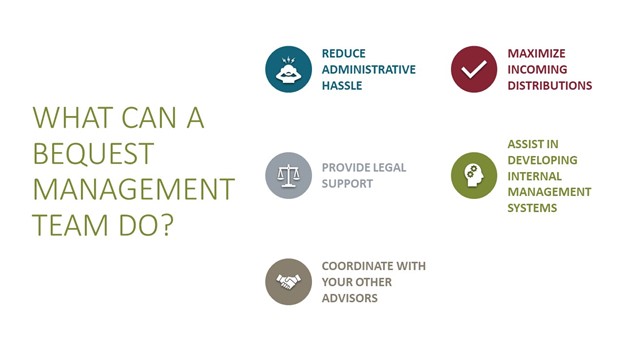February 7th, 2022
Managing a Charity and Overwhelmed?? Delegate Your Bequest Management!
Posted in: Estates, Trusts & Probate Featured Tax Law Tagged: Rebecca A. O'Neill, Sarah J. Broder
Author: Sarah J. Broder & Rebecca A. O'Neill

Managing a charitable organization can be extremely challenging. There are a lot of moving parts that take energy and time away from actually doing the charitable work. No matter the size of your team, there are never enough resources, and it can be difficult to have the detailed knowledge and tools required for the many different fields. Trying to juggle countless responsibilities can feel like an uphill battle; even prioritizing the tasks can be extremely time-consuming.
With all you have to do, you don’t want to miss maximizing your donor bequests and potentially leave money on the table.
That is where a bequest management team comes into play. A well-rounded bequest management team can:

- REDUCE ADMINISTRATIVE HASSLE. Monitoring incoming gifts, bequests, and legacies can be a full-time job in and of itself. By delegating this to a team devoted solely to this task, you can free up time for yourself and your staff to focus on the more substantive aspects of your organization’s work.
- MAXIMIZE INCOMING DISTRIBUTIONS. A team with an extensive legal background in trust and estate administration, coupled with strong tax and litigation experience, is the perfect partner to ensure that your organization is receiving the maximum amount to which it is entitled with each incoming donation.
- PROVIDE LEGAL SUPPORT. Without proper supervision and management of the legal proceedings associated with receiving gifts from individuals, estates, and trusts, a charitable organization can leave significant funds “on the table” so to speak. You never know when your charity’s interests may be compromised by the actions of other beneficiaries or interested parties. Even if you have some knowledge in this area, you may not have the time to investigate it or take the appropriate legal action necessary to yield positive results for your organization. A bequest management team can also advise your organization regarding specific legal or ethical problems that may arise with major gifts and planned giving, such as issues relating to restricted gifts or endowments.
- ASSIST IN DEVELOPING INTERNAL MANAGEMENT SYSTEMS. When a charitable organization has a small team, it is often difficult to find the time to create a system that works. A bequest management team can help you develop an efficient system to manage all incoming bequest-related communications.
- COORDINATE WITH YOUR OTHER ADVISORS. Your organization also needs support in other fields, (e.g., auditing, accounting, tax, corporate governance, etc.). A bequest management team is well-positioned to collaborate with your other advisors to ensure that your organization satisfies its various compliance requirements and maintains its tax-exempt status.
Stein Sperling has a knowledgeable team of tax, estates and trusts, and business attorneys providing a wide range of legal services to assist clients through the complex and evolving laws and regulations unique to the tax-exempt world, including an experienced bequest management team. We provide charitable organizations with a full range of legal services, with respect to formation, state and federal tax compliance, corporate governance and general operational matters.




